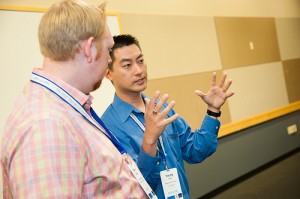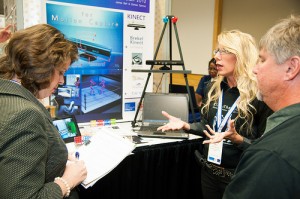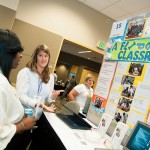Well, thousands of people in the U.S. submit applications for consideration to be one of about 100 educators who will be invited to attend the US Forum. There are similar events held all year all across the globe (over 250,000 people worldwide submit applications).
At each event, these educators spend a few days getting to know each other, sharing ideas, making connections, getting ideas, presenting their projects, working together, hearing incredible speakers, seeing cool demos (this year, we got our private Windows 8 live demo) and celebrating education…..but at the core of each event is the idea that they themselves are being honored and celebrated for their true spirit of innovation in the classroom. Teachers spend a few days being truly recognized for their awesomeness (for lack of a better word). Sure, there is a common tech-thread in the projects that were submitted, but technology was only one aspect. What is being identified is teachers who are designing lessons that quite simply are at an entirely different level than most. How are they doing that? They are having their students tackle real world problems through collaboration, problem solving, building and creating knowledge based on real hands-on experiences, integrating digital learning, and extending learning far outside the classroom….and it truly takes an innovative teacher leading the way…..being a true agent of change. As you can imagine, this type of out-of-the box approach is sometimes a fish out of water….NOT HERE….this type of out –of-the-box style is exactly what these projects and teachers have in common. What we find across the world is that teachers like these tend to be “islands unto themselves”. Teachers that are doing things that are innovative, creative, and out-of-the-box sometimes don’t necessarily get the support you might imagine. These are teachers who are doing what they do not because they are trying to increase test scores or to get a better parking spot…these are teachers who are trying to develop students with the necessary skills and confidence to solve problems in the world they are going into. It’s a much higher calling. And they crave others who see better and different ways forward in their classrooms, in their schools, in their districts, in their states and counties, in their countries, and in OUR world.How do they do it? They ask different questions; they find reasons why they CAN do things; they figure out how to make things happen; they find people who say YES when others say NO; they find people who will help them when others will not; they find ways to inspire and engage their students in 21st Century ways as opposed to traditional methods, they use a variety of tools to plan and design experiences that will allow their students to use their minds to think and apply that learning…not simply give back what they’ve been told or shown; they believe the days of a teacher-centered classroom no longer have a place in our education institutions; they believe students best learn by using their hands to experience their learning—not just to take notes; they believe there are other ways to evaluate classes besides outdated traditional methods.
Students: Does that sound like a class you’d like to be in all year? Parents: Does that sound like a class you’d like to have your own children connected with? Administrators: Does that sound like a teacher you’d like to have in your school? Policy makers: if there were schools which embraced that philosophy…wouldn’t you love to call those yours? Politicians: If all of our schools were full of teachers like that, wouldn’t that be a way for the United States to reclaim our lead in education across the world?

True passion for education and learning is the only "common core standard" in this group of teachers
Ahh, but we would not be reclaiming that lead based on test scores…not because we met some minimum national standards…we would be claiming a lead based on actually developing students who come out of schools ready to address the problems with confidence and a large repertoire of tools– digital, mental, and physical.
OK, back to the Innovators Forum and the value of innovation to the world.
What was incredible was there were teachers from every grade from Pre-K all the way to 12th, teachers from subjects ranging from Art to Physical Education to Science to Math to Computer Science to English to Foreign Language, teachers from public and private schools, teachers from urban and rural schools, teachers from well-to-do as well as poverty-stricken areas; and teachers from huge and very small schools. My point being is each teacher had plenty of obstacles to go around, plenty of hurdles to jump, plenty of reasons NOT to do what they did—yet they found the one reason to do it. And they did it in style. And that’s why they were in Seattle for the Partners in Learning Innovators Forum.
And out of that group of incredible innovators, an even more select group was then selected to represent the United States in a similar Forum but at the global level. Last year, the United States had several teachers who were award winners at the Global Forum—we look forward to seeing how we’ll do this year (to be held in Prague in Czech Republic). This global forum is a week-long event hosting over 75 countries that bring some of their country’s most innovative teachers. The impact it has is truly world wide.
Ok, back to my original prompt: What is the value of innovative education? Education systems all across the world, including our wonderful country of the United States, find themselves stuck in antiquated, outdated, ineffective, boring, out-of-focus, test-centric, and broken systems. And we need educators who are willing to break down stereotypes, barriers, and obstacles…to take chances…to take some risks…and we need administrators to support them. We need students to value entering those classrooms because they want to learn—not because they want a grade. We need parents to support their children when they select courses based on love and passion—not based on what looks good on a transcript. We need administrators to look past standardized tests as a basis for school evaluation, curriculum development and schedule creation. We need politicians to give teachers and schools the authority and power to make their own decisions and the chance to let excellence develop. We need colleges to allow entering freshmen to be selected based on hard work and passion and curiosity, not on a rigid checklist of standardized criteria. We need fellow teachers not to be intimidated by innovation happening around them…but to ask how they can be a part of it. And if we all embrace what MUST happen, we can take our entire education system to entirely new levels. Looking ahead, if we truly want the best for our students, then we must find a different way forward.
If this post makes sense to you, I’d love to connect. Find me…




